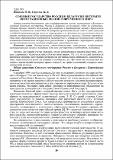| dc.contributor.author | Ипатова, Ольга Валерьевна | |
| dc.contributor.author | Стрелец, Михаил Васильевич | |
| dc.coverage.spatial | Брест | ru_RU |
| dc.date.accessioned | 2020-10-28T12:12:38Z | |
| dc.date.available | 2020-10-28T12:12:38Z | |
| dc.date.issued | 2020 | |
| dc.identifier.citation | Ипатова, О. В. Союзное государство России и Беларуси в интерьере интеграционных реалий современного мира / О. В. Ипатова, М. В. Стрелец // Ученые записки Брестского государственного технического университета: гуманитарные науки = Scientific Proceeding of Brest State Technical University: The Humanities Sciences : сборник научных трудов / Министерство образования Республики Беларусь, Учреждение образования "Брестский государственный технический университет" ; редкол.: М. В. Стрелец [и др.]. – Брест : БрГТУ, 2020. – Выпуск 2. – С. 20–25. – Библиогр.: с. 25 (10 назв.). | ru_RU |
| dc.identifier.uri | https://rep.bstu.by/handle/data/8282 | |
| dc.description | Ipatova О. V., Strelets М. V. Uunion State of Russia and Belarus in the interior of inte-gration reality of the modern world | ru_RU |
| dc.description.abstract | Авторы статьи доказывают, что конфедеративная модель, прописанная в Договоре о создании Союзного государства России и Беларуси, по большому счету не состоялась. Главная причина такого положения дел состоит в противоречии между стремлением правящих политических элит РФ и РБ набирать пропагандистские очки за счет заявлений о твердой приверженности курсу на интеграцию и их фактическим нежеланием делегировать значительный объём полномочий наднациональным органам. Союзное строительство явно сдерживается нестыковкой политических и социально-экономических систем, незаинтересованностью белорусского руководства в проведении структурных реформ, неудовлетворительными темпами унификации законодательства. | ru_RU |
| dc.language.iso | ru | ru_RU |
| dc.publisher | БрГТУ | ru_RU |
| dc.subject | политика | ru_RU |
| dc.subject | politics | ru_RU |
| dc.title | Союзное государство России и Беларуси в интерьере интеграционных реалий современного мира | ru_RU |
| dc.type | Статья (Article) | ru_RU |
| dc.identifier.udc | 395 | ru_RU |
| dc.abstract.alternative | The authors of this article set out to analyze the complex factors which hold back Belarusian-Russian integration. For readers, the author’s vision of achieving the correlation of the organizational, legal, conceptual, practical aspects of union building is presented. The authors use historical-genetic, historical-comparative, historical-systemic, historical-typological methods. The authors argue that the confederate model prescribed in the Treaty on the Creation of the Union State of Russia and Belarus did not take place. The main reason is the contradiction between the desire of the Russian Federation and the Republic of Belarus of the ruling political elite to gain propaganda points due to allegations of a firm commitment to integration course and their actual unwillingness to delegate a significant amount of authority to supranational bodies. Union building is constrained by the mismatch of political and socioeconomic systems, disinterest of the Belarusian leadership in the implementation of structural reforms, unsatisfactory pace of unification of legislation. | ru_RU |
